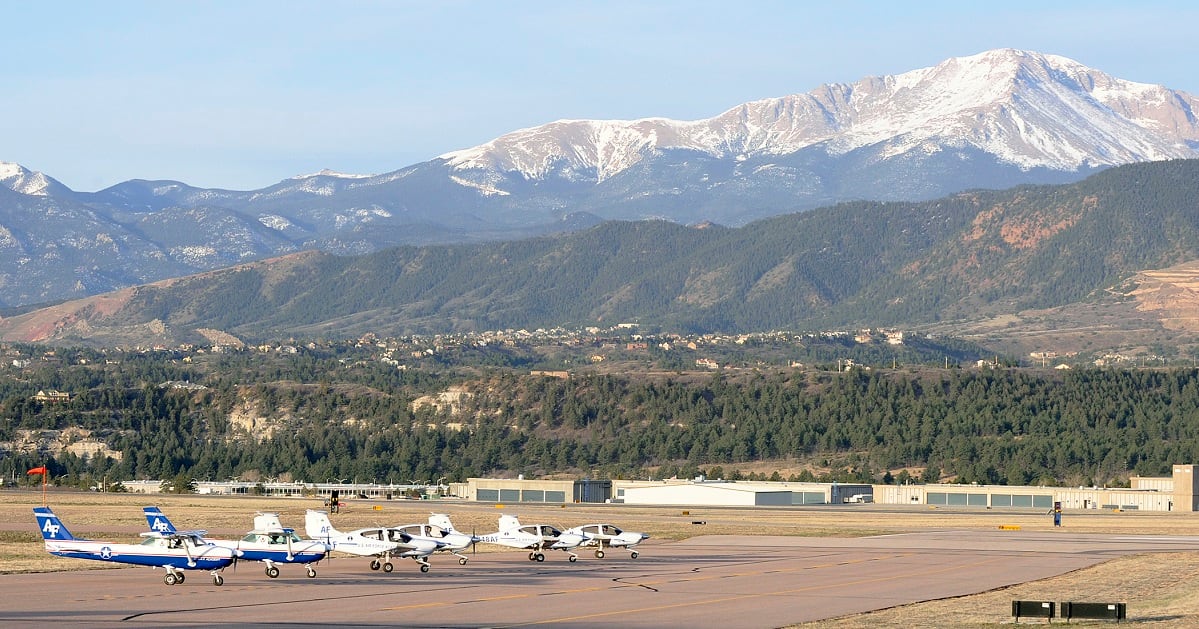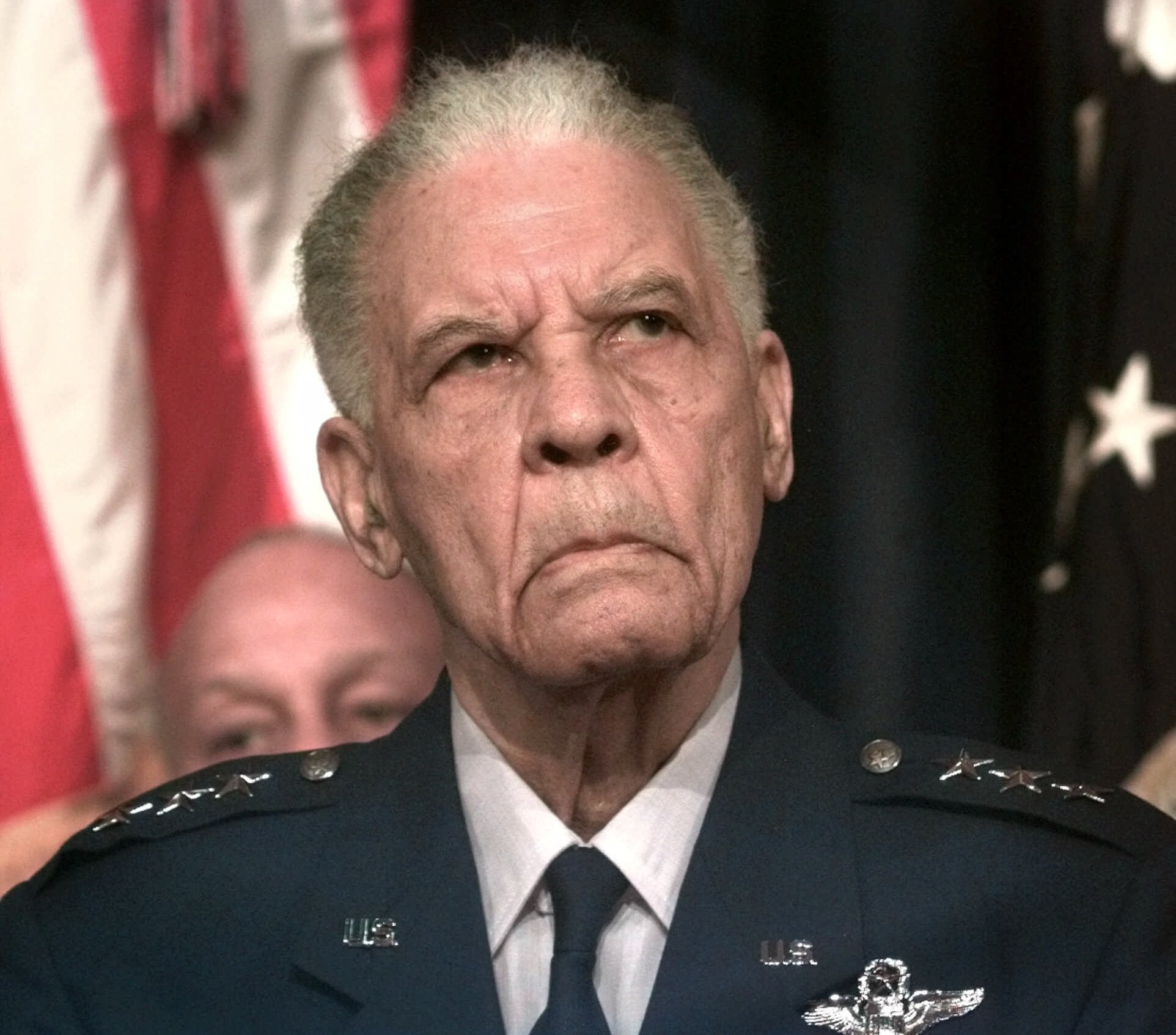[Editor’s note: This story has been corrected to properly identify one of the units Davis commanded.]
Gen. Benjamin O. Davis Jr., the legendary Tuskegee Airman and World War II pilot, will be celebrated today as the Air Force Academy names its airfield after the ground-breaking aviator.
“For our family, this is the greatest honor that we could ask for,” said Douglas Melville, his great-nephew, in an academy news release. “The airfield at the academy is one of the busiest airfields in the entire world, and it’s an honor that his name will live on [at] that airfield until infinity.”
It should come as a surprise to no one that Davis was all about breaking barriers. His father, a soldier, was the first black general officer in the U.S. armed forces.
The younger Davis studied at the University of Chicago before following in his father’s footsteps into the Army and enrolling in the U.S. Military Academy at West Point in 1932, where he was immediately ostracized. No one would speak to him unless absolutely necessary, let alone be his roommate. He once said of his years there that he was “an invisible man.”
“I was to be silenced solely because the cadets did not want blacks at West Point” he wrote in his 1991 autobiography. "Their only purpose was to freeze me out. What they did not realize was that I was stubborn enough to put up with their treatment to reach the goal I had come to obtain.”
In his junior year, he applied for the Army Air Corps, but was rejected because it did not accept black pilots. After graduating West Point in 1936, he served as an infantry officer in an all-black regiment, according to the news release.
But Davis’ aspirations to fly were realized a few years later.

At the beginning of World War II, he was assigned to the first training class at Tuskegee Army Air Field, Alabama.
Davis earned his pilot wings in 1942, becoming one of the first aviators who would become known as the Tuskegee Airmen. He quickly rose to lieutenant colonel and, at age 29, assumed command of the first all-black air unit, the 99th Pursuit Squadron, under the 12th Air Force. Deployed to Tunisia, North Africa, and flying P-40 fighters, the squadron saw combat for the first time in a dive-bombing mission against a German-held position as part of Operation Corkscrew, the Allied invasion of the Italian island of Pantelleria, between Sicily and Tunisia, on June 11, 1943.
He returned to the States in October 1943 to organize and take command of the 332nd Fighter Group, 15th Air Force. Two months later the 332nd deployed to Italy, where his group flew P-51 Mustangs to escort B-17 and B-24 heavy bombers over Europe. In the spring of 1945, Davis led a squadron of fighters on a hazardous mission against airfields in southern Germany and was awarded a Silver Star.
The unit racked up an outstanding combat record against the German Luftwaffe. Davis himself flew 60 combat missions during the war and was promoted to colonel.
Davis continued his Air Force career at the Pentagon and overseas. After graduating the Air War College in 1950, he commanded a fighter wing in the Korean War and earned his first star in 1954, the first black general officer in the service. Five years later he became the first African American to reach the rank of major general, and he earned a third star in 1965
He was an instrumental figure in desegregating the Air Force and later pushing for women to be accepted into the Air Force Academy, according to the release.
“General Davis was all about breaking barriers," Melville said in the release. "It was a huge passion of his — really because it was so inefficient. He looked at breaking barriers as, it’s the most efficient way to operate as a nation: united.”
Davis retired as a lieutenant general in 1970. In 1998, he was advanced to the grade of general. President Bill Clinton pinned on his fourth star during a White House ceremony that included the Davis family and original members of the Tuskegee Airmen.
The general died on independence Day 2002 at Walter Reed Military Medical Center.

This is not the first naming ceremony in his honor. The conference center at MacDill Air Force Base, Florida, where Davis served as deputy commander of U.S. Strike Command, bears his name. Then, in August 2017, West Point’s newest barracks were named after the trailblazing warrior who had been shunned 85 years before by his fellow cadets.
“If you want to know what ‘Duty, Honor, Country’ look like, just read a little bit about Benjamin O. Davis Jr. and your jaw will drop," said Col. Ty Seidule, the head of West Point’s history department, after Davis’ name was chosen in 2015. “So, it’s our chance to acknowledge one of our greatest graduates.”
— Staff writer Meghann Myers contributed to this report




